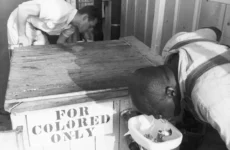Governor turns his back on World-Famous Tourist city
“This agreement is a win-win-win; a win for the local governments of Niagara Falls, Buffalo, and Salamanca, a win for the Seneca Nation whose exclusivity will be honored, and a win for all New Yorkers with hundreds of millions of dollars coming to the State now and for the future,” Governor Cuomo announced on June 13, 2013 at a news conference in Niagara Falls, bringing to a close a lengthy dispute with the Senecas over territorial claims concerning their gaming operations.
That “future,” of course, didn’t even last four years.
If Governor Cuomo had actually taken the time to read the new compact with the Seneca Nation that he was triumphantly waving in the air that afternoon, he might have noticed that his crack Albany legal staff had failed to include payments to the state past 2016.
And now the city of Niagara Falls is paying a heavy price for his incompetence, forced into sudden withdrawal, literally cold turkey, from millions in revenue sharing.
The city’s credit rating was recently downgraded by Standard and Poor’s to just above junk status, while its 2018 proposed budget contains hefty tax increases for both residents and businesses to make up for the shortfall. Vital institutions like Niagara Falls Memorial Hospital, the Niagara Falls City School District and the Niagara Frontier Transportation Authority, which runs Niagara Falls International Airport, will all lose their dedicated stream of casino funds.
The tax increases, if passed, will cause Niagara Falls levies to bump up against the constitutionally-allowed ceiling for municipalities in New York State, as well as accelerate the exodus of both people and businesses out of the city. Since 2009, the city’s population has decreased by nearly 3,000. Of course, it’s the more affluent who can afford to take flight, leaving behind those who can least afford the city’s burgeoning levels of taxation.
The loss of casino revenue inevitably led to higher taxes, since the Dyster administration refuses to cut spending, or demand a share of the tourist wealth that disappears into Niagara Falls State Park, or gets shipped out in the form of hydropower from the Power Project. The higher taxes drive people out, shrinking the tax base, ultimately hastening the city’s downward fiscal spiral. It’s a vicious cycle.
You’d think, too, that Mayor Dyster, having been in office while his city endured the pain of the 2009-2013 dispute, might have demanded that Niagara Falls not be put in that position again. He might have insisted that the Nation pay the city directly, rather than through the state. He might have sought guarantees from his new good friend Andrew Cuomo that, should another interruption in casino funding take place as the result of any disagreement with the Seneca Nation, the state see the city through with emergency aid.
Obviously, he didn’t do any of that. Nor did his own Corporation Counsel or any of the expensive outside legal firms the city retains happen to notice the termination of payments in the compact. Who knows, maybe they didn’t even review it at all. Why should they? The state will take good care of us – Gov. Cuomo is looking out for our interests – so why bother?
It’s been years since Gov. Cuomo came here and amid great fanfare promised the city of Niagara Falls tens of millions of dollars for WonderFalls, and something he called the “Downtown Niagara Falls Development Challenge.” Now it seems he only stops in as an afterthought, to visit some new, ugly, subsidized box hotel that’s supposed to be our economic salvation, and doesn’t take questions from reporters.
The governor has, however, seen fit to shower money on other cities over the past couple of years, since he’s apparently given up on Niagara Falls.
It was at one of his gala events, where Gov. Cuomo recycled $10 million in taxes through Albany and back to the small Genesee County city of Batavia, that WGRZ-TV’s reporter Dave McKinley managed to ask him last week if he intended to help the city of Niagara Falls deal with this latest crisis.

Gov. Cuomo derisively wisecracks to a local TV reporter that perhaps Niagara Falls should be reimbursing him for lost casino revenues.
“It’s not a fair request. They had the upside… they got paid when the state got paid,” answered Mr. Cuomo. “But why would I ever guarantee their loss?”
“You know, maybe they want to make up the shortfall to me!” the governor leered. He then laughed mockingly as aides herded him away.
“It was just too easy to go into the cookie jar when you have no self control and no adult supervision… The stretching of the 99-H rules of the Upstate Gaming Act of 2013, and the lack of anyone calling foul has put us in the position we are now in.” said Councilman Kenny Tompkins in response to the governor’s contemptuous quip and arrogant demeanor.
Niagara Gazette City Editor Mark Scheer also editorialized, “Niagara Falls has been very good to the state of New York over the years. The casino contributed tens of millions of dollars to state coffers, just as Niagara Falls State Park and the New York Power Authority have done for many years before.”
Gov. Cuomo’s disregard for the city of Niagara Falls is only exceeded by his desire to exploit its resources and oppress its citizens.



















